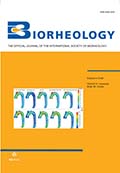Authors: Gosset, Marjolaine | Berenbaum, Francis | Levy, Arlette | Pigenet, Audrey | Thirion, Sylvie | Cavadias, Simeon | Jacques, Claire
Article Type:
Research Article
Abstract:
NOTE: Several parts of this article were copied verbatim or close to verbatim from an article that was published in Arthritis Research & Therapy, 2006, 8:R135, doi:10.1186/ar2024. No acknowledgement of, or reference to, the previously published article in Arthritis Research & Therapy was made at the time of publication of the article in Biorheology. In this updated version of the article all the copied parts are highlighted. An Erratum has been published in Biorheology 49(4) (2012), 299. Knee osteoarthritis (OA) results, at least in part, from overloading and inflammation leading to cartilage degradation. Prostaglandin E2 (PGE2 )
…is one of the main catabolic factors involved in OA in which metalloproteinase (MMP) is crucial for cartilage degradation. Its synthesis is the result of cyclooxygenase (COX) and prostaglandin E synthase (PGES) activities whereas NAD+-dependent 15 hydroxy-prostaglandin dehydrogenase (15-PGDH) is the key enzyme implicated in the catabolism of PGE2 . Among the isoforms described, COX-1 and cytosolic PGES are constitutively expressed whereas COX-2 and microsomal PGES type 1 (mPGES-1) are inducible in an inflammatory context. We investigated the regulation of the COX, PGES and 15-PGDH and MMP-2, MMP-9 and MMP-13 genes by mechanical stress applied to cartilage explants. Mouse cartilage explants were subjected to compression (0.5 Hz, 1 MPa) from 2 to 24 h. After determination of the PGE2 release in the media, mRNA and proteins were extracted directly from the cartilage explants and analyzed by real-time RT-PCR and western blot respectively. Mechanical compression of cartilage explants significantly increased PGE2 production in a time dependent manner. This was not due to the synthesis of IL-1, since pretreatment with IL1-Ra did not alter the PGE2 synthesis. Interestingly, COX-2 and mPGES-1 mRNA expression significantly increased after 2 hours, in parallel with protein expression. Moreover, we observed a delayed overexpression of 15-PGDH just before the decline of PGE2 synthesis after 18 hours suggesting that PGE2 synthesis could be altered by the induction of 15-PGDH expression. MAPK are involved in signaling, since specific inhibitors partially inhibited COX-2 and mPGES-1 expressions. Lastly, compression induced MMP-2, -9, -13 mRNA expressions in cartilage. We conclude that dynamic compression induces pro-inflammatroy mediators release and matrix degradating enzymes synthesis. Notably, compression increases mPGES-1 mRNA and protein expression in cartilage explants. Thus, the mechanosensitive mPGES-1 enzyme represents a potential therapeutic target in osteoarthritis.
Show more
Keywords: PGE_2, mPGES-1, COX-2, 15-PGDH, MMP, murine cartilage, mechanical stress, osteoarthritis
DOI: 10.3233/BIR-2008-0494
Citation: Biorheology,
vol. 45, no. 3-4, pp. 301-320, 2008
Price: EUR 27.50





